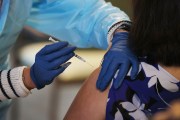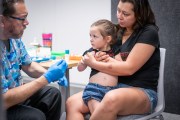In pockets of the internet, soon-to-be-parents swap birthing plans with each other, offering a range of advice: Ask hospital staff to let you move freely during labor. Demand at least an hour of immediate skin-to-skin bonding with your newborn. Decline any offer by nurses to bathe the infant.
Some of these birthing checklists — offered in playful fonts on Facebook and Instagram, or screenshotted behind personal testimonials on TikTok — also suggest something more consequential: That parents decline the hepatitis B vaccine that’s typically administered to newborns within the first day of life.
The vaccine, given through a multi-shot series in early infancy, is safe and effective at helping to prevent hepatitis B, a viral infection of the liver that can cause both short-term and chronic disease, including liver damage, liver cancer and death. A child infected with the virus early in life is more likely to later suffer from chronic disease.
But anti-vaccine activists for years have spread misleading information about the vaccine, in part by tying hep B primarily to sexual activity and drug use and ultimately questioning why, then, newborns need it. A pregnant person who has hepatitis B can spread the virus to their newborn during delivery, but activists have asked why a pregnant person who has tested negative for the virus should still get the shot for their baby — even though it can spread in other ways.
This was the backdrop as the Advisory Committee on Immunization Practices (ACIP), a government-backed vaccine panel that has been recently politicized, prepared to halt universal use of the hepatitis B vaccine at birth. But the panel on Friday abruptly tabled a vote that would have delayed the first vaccine shot until an infant is at least one month old. Some members suggested that the one-month delay for the vaccine might not be long enough, while others questioned implementing a delay at all.
It’s unclear when the panel, whose recommendations help determine what vaccines in America are covered by insurance, will resume the discussion.
The same panel also voted the day before to add restrictions to a combination vaccine that helps protect against measles and other diseases, one of the first shake-ups to the childhood vaccine schedule under Health and Human Services Secretary Robert F. Kennedy Jr., an anti-vaccine activist.
Medical experts warn delaying the hepatitis B vaccine could lead to more children in the United States infected and developing long-term health issues. Before routine vaccination was implemented in the early ’90s, an estimated 18,000 infants and children became infected with hepatitis B annually. Infant infections have since dropped by 95 percent.
The stakes could be high: Up to 90 percent of newborns infected with hepatitis B develop chronic disease. But when the hep B vaccine is given within 24 hours of birth, it is also up to 90 percent effective in preventing perinatal infection.
“Every single case of hepatitis B in a child is a tragedy, because we have the tools to prevent this,” said Dr. David Higgins, an assistant professor of pediatrics at the University of Colorado School of Medicine. “So no number of children getting hepatitis B and developing chronic disease is acceptable in the U.S.”
The online birthing plans show how internet messaging toward pregnant people can get tangled in falsehoods and rumors. But it also gives a window into how these early decisions on behalf of a newborn can be effectively used as a litmus test of fitness for motherhood.
Messaging around the hep B vaccine — and suggestions to skip other standard medical treatments for newborns such as an eye ointment routinely given to newborns to prevent bacterial infections, and a vitamin K shot or oral supplement — tries to tie a child’s health to maternal identity, said Andrea Love, an immunologist and microbiologist who has examined the hep B vaccine in her newsletter. That’s particularly potent at the height of a Make America Healthy Again campaign that targets parents’ anxieties.
“A lot of this is kind of playing into, ‘mom knows best’ and exploiting this fear that you have this tiny human that you’re supposed to look out for and keep alive. Instead, they’re forcing you to inject them with all these poisons, right?” she said.
The dynamic prompted Chelsea Eckler, a doula in Texas, to record a TikTok over the summer in which she plays both concerned parents and a health provider trying to dispel misconceptions about the hep B vaccine.
In an email, Eckler said she made the video because the vaccine had become such a sensitive topic for her clients. She said her videos on the hep B vaccine are aimed at getting people to be more open about their concerns.
“The goal is to bring the discourse to my comment section to learn and also teach people how to have proper discussions concerning any and everything when it comes to their pregnancies and newborns,” she said.
Hepatitis B is spread through blood and body fluids. While it’s often associated with sexual activity and intravenous drug use, it can also pass from a birthing parent to a child during delivery. While it is rare, hepatitis B can be transmitted by saliva if there is an undetectable amount of blood — and through other people in a newborn’s life who might not even know they’re positive.
Instances of potential exposure can include a child coming into contact with blood from a close person’s skin cut or biting, including in a day care setting. Hepatitis B can also live outside the body for up to seven days. Still, the topic of hep B can make some parents uneasy or make them feel like it says something about the morality of their private lives.
“There’s a whole reframing about how hepatitis B can be transmitted that needs to happen, and it’s not going to be an easy fix,” Love said.
-
Read Next:
Panel discussion about the delay divided members, with some saying their recommendation was aimed in part at addressing concerns from some parents at a time of shifting trust in federal agencies providing reliable vaccine information — even though the vaccine is not connected with severe adverse effects. A handful of members within ACIP questioned why the panel was voting on the issue at all.
“What will happen is that we will increase the risk of harm based on no evidence of benefit … I think we will be creating new doubts in the mind of the public that are not justified,” said ACIP member Dr. Cody Meissner.
Skepticism about vaccines in general is not unusual, said D. J. Hicks, an associate professor of philosophy at University of California, Merced, who has studied what they describe as public scientific controversies.
“There’s a lot of social pressure to make the right decision for your baby, and blaming mothers explicitly or implicitly for any problems that the child might have — this extends back during pregnancy, sometimes even pre-pregnancy,” they said. “But the relevancy of vaccines is intense pressure on mothers to navigate often very complicated health care decisions without necessarily a lot of background expertise.”
Discourse about the hep B vaccine’s usefulness for newborns has existed online for years but now has a megaphone within the government. Kennedy has questioned the safety of the vaccine. Casey Means, a wellness entrepreneur and nominee for surgeon general, has connected hep B and sexual activity in interviews. In June, a key member of the revamped ACIP explained their interest in reexamining why the hep B vaccine is given to every newborn.
“Unless the mother is hepatitis B positive, an argument could be made to delay the vaccine for this infection, which is primarily spread by sexual activity and intravenous drug use,” said Dr. Martin Kulldorff, chair of the panel.
-
Read Next:
But Kulldorff’s framing doesn’t take into account that not all pregnant people are screened for hepatitis B — insurance claims data from 2014 showed gaps in testing among pregnant people with commercial insurance and Medicaid. The Centers for Disease Control and Prevention estimate that between 12 percent and 16 percent of pregnant people do not receive enough prenatal care to screen properly for hepatitis B. And some are screened early enough in pregnancy that it leaves a window open for later infection.
“There are cracks in our screening during pregnancy,” Higgins said. “The birth dose is a safety net in case they fall through the cracks.”
Before ACIP tabled its hep B vote, it voted to suggest that all pregnant people get tested for hepatitis B — a call that raises logistical questions about equal access to prenatal care, widespread testing and the cost on families.
Before tabling the discussion, the panel did not share data to explain why it was proposing a one-month delay, and it’s not immediately clear how that impacts the timeline for the rest of the shots in the hepatitis B series.
It’s a reflection of how the panel is ignoring clear decision-making processes for reaching recommendations, said Dr. Sean T. O’Leary, chair of the Committee on Infectious Diseases for the American Academy of Pediatrics (AAP).
AAP has stopped participating in meetings, which recently stopped using outside experts for working groups. Kennedy has publicly disparaged the medical organization, which is made up of pediatricians and has been issuing vaccine guidance since 1935 — decades before ACIP was created. The group continues to recommend the hep B birth dose, as well as COVID-19 shots for infants and children, in another departure from the administration.
“I really don’t think you can trust anything that comes out of this committee,” O’Leary said.
-
Read Next:
As part of its two-day meeting, the panel on Thursday also voted to limit use of the combination vaccine for measles, mumps, rubella and varicella (chickenpox) to children who are 4 years old and up. Known as the MMRV vaccine, it is one of two options for parents to vaccinate their children against measles.
The panel based its decision on the vaccine’s well-known risk of a slight increase in febrile seizures, even though the vaccine is safe and the seizures are generally benign. (There is no evidence of this risk for older children.) The changes will ultimately mean more vaccine shots for some kids, and different costs for parents who choose the MMRV shot earlier since it might not be covered by insurance.
ACIP’s votes come amid major potential upheaval in vaccine policy in the United States. Kennedy mass fired the previous panel and appointed several members with a history of vaccine skepticism. The recently ousted director of the CDC testified this week to senators that Kennedy told her to preapprove changes from the vaccine panel, an assertion that the health secretary disputed.
Higgins said a delay to the vaccine won’t create an immediate change in the number of hepatitis B cases because it’s not tied to an illness that has seasonality like COVID-19 or influenza. He said hepatitis B can silently damage the liver until it becomes more deadly later in life.
This week, a major health insurance group announced its members intend to keep covering ACIP-recommended vaccines that were in place at the start of September at no cost to patients through the end of 2026. But there are still questions about the long-term availability of the vaccines in hospitals and future coverage.
“There are a lot of unanswered questions,” he said. “A recommendation like this does not just affect whether a provider says, ‘Oh, I think this is a good idea,’ or ‘Hey, the CDC recommends this.’ It affects whether the hospital chooses to stock it, and it affects whether insurance is going to pay for it.”
Great Job Barbara Rodriguez & the Team @ The 19th Source link for sharing this story.







